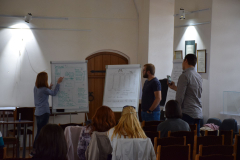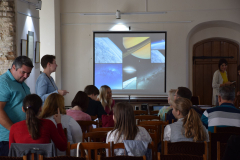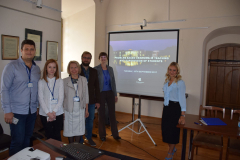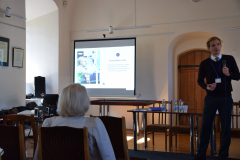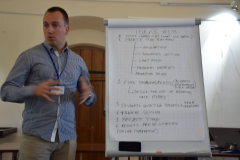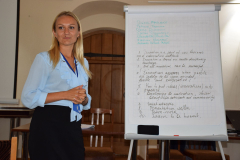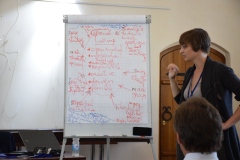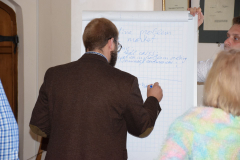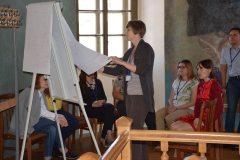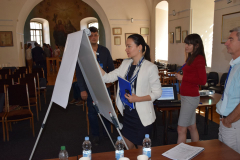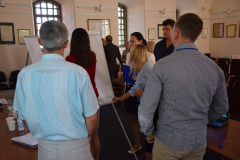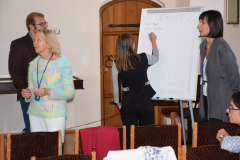The main event started on September 18th, at 09:00 a.m. at the NaUKMA historical and Museum Center. The participants represented Germany, Denmark, Italia, Serbia and Ukraine.
The first speaker was Univ.-Prof. Dr. Thorsten Blecker Hamburg University of Technology Institute of Business Logistics and General Management. He started with a short country overview of Serbia and Ukraine in aspects of science, technological development and innovation activity. Then he showed his vision of perspectives of innovation, he stressed on open innovation processes which were characterized, in contrast to traditional closed innovation processes, by the fact that actors disclose their innovations (“free revealing”) without expecting an immediate return therefore.He gives us such interesting examples grassroots innovation as:
- Community-led solutions for sustainability (e.g.: promising new ideas and practices,but often struggle to scale up and spread beyond small niches)
- Networks of activists and organizations generating novel bottom up solutions for sustainable development.
Dr. Thorsten Blecker explained us technology transfer as the movement of technological and technology-related organizational know-how among partners (individuals, institutions, and enterprises) in order to enhance at least one partner’s competitive position.
Workshops were targeted on the new ideas generating in the sphere of students’ academic mobility activation, more attention was given to the question of providing virtual mobility.
The second speaker was Dr. Larsen from Aalborg University, Denmark, who introduced the philosophy of Problem based learning for us. The PBL-model assumes that students learn best when applying theory and research based knowledge in their work with an authentic problem. At the same time, the model supports students in the development of their communication and cooperation competences and in acquiring the skills required when taking an analytical and result-oriented approach.
The AAU model includes project work based on authentic problem
s, self-governed group work and collaboration. The AAU model provides students with tools for independent acquisition of knowledge, skills and competences at an advanced academic level. During their studies, many students will also have the opportunity to cooperate with external partners on the solution of scientific problems. Introduction to best practices in mobility programmes Mr. Ciccullo and Mr. Sani POLIMI, Italia, was very impressive.
They told us about advertising and recruiting of mobility and programme Buddies for integration foreign students to community of Politecnico di Milano. Politecnico di Milano offers its students the opportunity to participate in high quality international projects based on EU programmes and special agreements with many partner universities. Every year, more than 1200 students from Politecnico di Milano take part in the international mobility programmes and they have the pleasure of welcoming about the same number of students from partner institutes. The students selected for a specific programme have the opportunity to enrich their academic experience by spending a period at a partner university, thereby acquiring credits fully recognised by Politecnico di Milano.
Finally, on Friday, 22th of September, we had a monitoring of the MILETUS project by National Erasmus+ office in Ukraine. Its main task was to examine the level of understanding and execution of the project by Ukrainian partners, moreover to pay attention to trouble moments, warn, prompt and so on. The results of the monitoring was sent to the grantor in Brussels.
So, the work of this session was very intensive and results are extremely important for the successful realization of the MILETUS project’s goals. From the MNAU side, thank all of the partners for the very productive workshop and a great organization.

